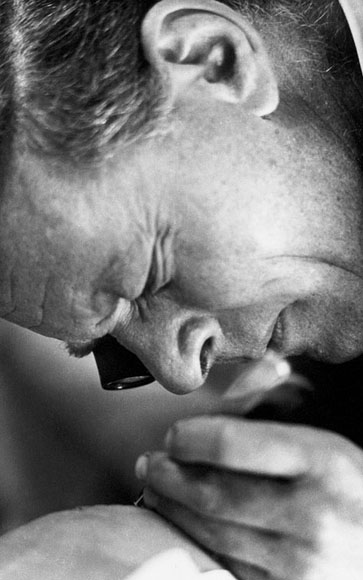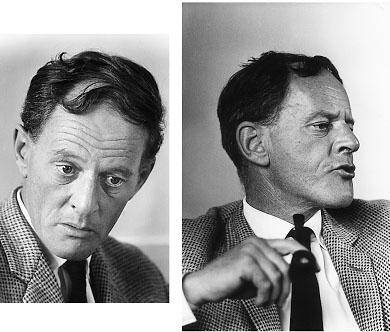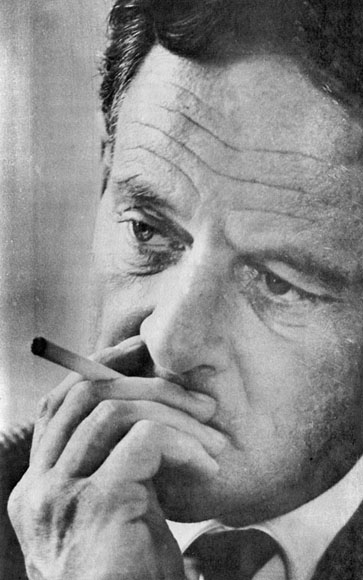A Fortunate Man (5 page)
Authors: John Berger

The surgery is unusually well equipped. There is stoving equipment for sterilizing and the instruments necessary for the suture of tendons, minor amputations, the removal of cysts, cauterization of the cervix, the application and removal of plaster for minor fractures. There is an anaesthetic machine: an osteopathic table: a sigmoidoscope. He says that he is constantly frustrated because he has not got his own X-ray plant or his own equipment for elementary bacteriology.
If possible, he always wants to prove everything for himself.
Once he was putting a syringe deep into a man's chest: there was little question of pain but it made the man feel bad: the man tried to explain his revulsion: âThat's where I live, where you're putting that needle in.' âI know,' Sassall said, âI know what it feels like. I can't bear anything done near my eyes, I can't bear to be touched there. I think that's where I live, just under and behind my eyes.'

As a boy Sassall was much influenced by the books of Conrad. Against the boredom and complacency of middle-class life ashore in England, Conrad offered the âunimaginable' whose instrument was the sea. Yet in this offered poetry there was nothing unmanly or effete: on the contrary, the only men who could face the unimaginable were tough, controlled, taciturn and outwardly ordinary. The quality which Conrad constantly warns against is at the same time the very quality to which he appeals: the quality of imagination. It is almost as though the sea is the symbol of this contradiction. It is to the imagination that the sea appeals: but to face the sea in its unimaginable fury, to meet its own challenge, imagination must be abandoned, for it leads to self-isolation and fear.
What resolves the contradiction and, in resolving it, places the whole drama on a level incomparably higher and more noble than the average petty life of self-seeking advancement, is the ideal of service. This ideal has a double meaning. The Service stands for all those traditional values which a privileged few who have faced and met the challenge esteem: esteem not as an abstract principle but as the very condition of practising their craft efficiently. And at the same time service also stands for the responsibility which the few must always carry for the many who depend upon them â the passengers, the crew, the traders, the ship-owners, the brokers.
Of course I simplify. And Conrad would not be the great artist he is if this were a fair summary of his attitude to the sea. But the simplification is enough to allow us to see why Conrad might appeal to a boy who was in revolt against his middle-class family background but who had no interest in becoming a Bohemian. He admired physical prowess. He enjoyed being practical and using his hands. He was inquisitive about things rather than feelings. He was stirred â like many boys of his class and generation â by the ideal of a moral example which might shame the opportunism of his elders.
In fact by the age of fifteen he had decided to become a doctor
rather than a sailor. His father was a dentist and consequently he had the opportunity of meeting doctors socially. When he was fourteen he was already hanging round the dispensary of the local doctor: nominally helping to wrap up medicine bottles, actually trying to listen to the consultations taking place in the next room. Yet a doctor can well be imagined as the equivalent of a Master Mariner.
Sassall's image of a doctor at that time was:
âA man who was all-knowing but looking haggard. Once a doctor came in the middle of the night and I could see that he slept too â his pyjama trousers were poking out through the bottom of his trousers. But above all I remember he was in command and composed â whereas everybody else was fussing and agitated.'
Compare this to Conrad's first introduction of the captain of the
Narcissus
:
Captain Allistoun, serious, and with an old red muffler round his throat, all day long pervaded the poop. At night, many times he rose out of the darkness of the companion, such as a phantom above a grave, and stood watchful and mute under the stars, his night-shirt fluttering like a flag â then, without a sound, sank down againâ¦. He, the ruler of that minute world, seldom descended from the Olympian heights of his poop. Below him â at his feet, so to speak â common mortals led their busy and insignificant lives.
In both impressions there is the same sense of authority: an authority which pyjama trousers or a night-shirt in no way diminish. Or consider Conrad's description of one of the worst moments in
Typhoon
. With the exception of the one word
gale
, it might describe the crisis of an illness, with the voice of Captain MacWhirr transformed into that of a doctor.
And again he heard that voice, forced and ringing feebly, but with a penetrating effect of quietness in the enormous discord of noises, as
if sent out from some remote spot of peace beyond the black wastes of the gale; again he heard a man's voice â the frail and indomitable sound that can be made to carry an infinity of thought, resolution, and purpose, that shall be pronouncing confident words on the last day when heavens fall, and justice is done â again he heard it, and it was crying to him, as if from very, very far â âAll right'.
From such material Sassall constructed his ideal of responsibility.
During the war Sassall served in the Navy as a surgeon. âThat was the happiest time of my life, doing major surgery in the Dodecanese. I was dealing with very real distress and on the whole making a success of it.' In Rhodes he taught peasants elementary medicine. He saw himself as a life-saver. He had proved his skill to himself and his ability to take decisions. With this proof came the conviction that those who lived simply, those who were dependent upon him, possessed qualities and a secret of living which he lacked. Thus, whilst having authority over them, he could feel he was serving them.
After the war, he married
1
and chose a remote country practice under the National Health Service, becoming the junior partner of an old doctor who was much liked in the district but who hated the sight of blood and believed that the secret of medicine was faith. This gave the younger man plenty of opportunity to go on working as a life-saver.
He was always overworked and proud of it. Most of the time he was out on calls â often having to make his way over fields, or walk, carrying his black boxes of instruments and drugs, along forest paths. In the winter he had to dig his way through the snow. Along with his instruments he carried a blow-lamp for thawing out pipes.
He was scarcely ever in the surgery. He imagined himself as a sort of mobile one-man hospital. He performed appendix and hernia operations on kitchen tables. He delivered babies in caravans. It would almost be true to say that he sought out accidents.
He had no patience with anything except emergencies or serious illness. When a man continued to complain but had no dangerous symptoms, he reminded himself of the endurance of the Greek peasants and the needs of those in âvery real distress', and so recommended more exercise and, if possible, a cold bath before breakfast. He dealt only with crises in which he was the central character: or, to put it another way, in which the patient was
simplified
by the degree of his physical dependence on the doctor. He was also simplified himself, because the chosen pace of his life made it impossible and unnecessary for him to examine his own motives.
After a few years he began to change. He was in his mid thirties: at that time of life when, instead of being spontaneously oneself as in one's twenties, it is necessary, in order to remain honest, to confront oneself and judge from a second position. Furthermore he saw his patients changing. Emergencies always present themselves as
faits accomplis
. At last, because he was living among the same people all the time, and because he was often called to the same cottage several times for different emergencies, he began to notice how people developed. A girl whom three years before he had treated for measles got married and came to him for her first confinement. A man who had never been ill shot his brains out.
One day he was called to a couple of old-age pensioners. They had lived in the Forest for thirty years. Nobody had anything very special to say about them. They went every year on the Old Folks' Annual Outing. They usually went to the pub at about eight every Saturday evening. A long time before, the wife had worked as a maid in the big house of a near-by village. The husband had worked
on the railway. The husband said that his wife âwas bleeding from down below'.
Sassall talked to her a little and then asked her to undress so that he could examine her. He went into the kitchen to wait until she was ready. There the husband looked at him anxiously and took the clock from the mantelpiece to wind it. At this age if the wife has to go into hospital, it can be the beginning of the end for them both.
When he went back into the parlour, the wife was lying on the ottoman. Her stockings were rolled down and her dress up. âShe' was a man. He examined her. The trouble was severe piles. Neither he nor the husband nor she referred to the sexual organs which should not have been there. They were ignored. Or, rather, he was forced to accept them, as they had done according to their own reasoning which he would never know.
He became aware of the possibility of his patients changing. They, as they became more used to him, sometimes made confessions for which there was no medical reference so far as he had learnt. He began to take a different view of the meaning of the term crisis. He began to realize that the way Conrad's Master Mariners came to terms with their imagination â denying it any expression but projecting it all on to the sea which they then faced as though it were simultaneously their personal justification and their personal enemy â was not suitable for a doctor in his position. He had done just that â using illness and medical dangers as they used the sea. He began to realize that he must face his imagination, even explore it. It must no longer lead always to the âunimaginable', as it had with the Master Mariners contemplating the possible fury of the elements â or, as in his case, to his contemplating only fights within the jaws of death itself. (The clichés are essential to the vision.) He began to realize that imagination had to be lived with on every level: his own imagination first â because otherwise this could distort his observation â and then the imagination of his patients. The older partner died. Sassall had to spend far more time in the surgery, listening. He also had to find another doctor to share his practice with. He decided to split the practice in two so that the other doctor should work with his own surgery in his own area. Then, still overworked, but with more time for the average patient, he began to observe himself and others.

He began to read â especially Freud. So far as a man can by himself, he analysed many of his own character traits and their roots in the past. It was a painful process â as Freud himself describes when discussing his own self-analysis. For six months or so, as a result of his resurrected memories, Sassall became sexually
impotent. It is impossible to say now whether this period of crisis was induced by his decision to examine within himself the basis of what up to now he had projected outwards as âthe unimaginable', or whether he entered a period of crisis and therefore decided to look more closely at himself. Either way it bears some resemblance to the period of isolation and crisis which precedes in Siberian and African medicine the professional emergence of the
shaman
or the
inyanga
. The Zulus have a name for this process. The
inyanga
, they say, suffers because the spirits will give him no peace and he becomes âa house of dreams'.
